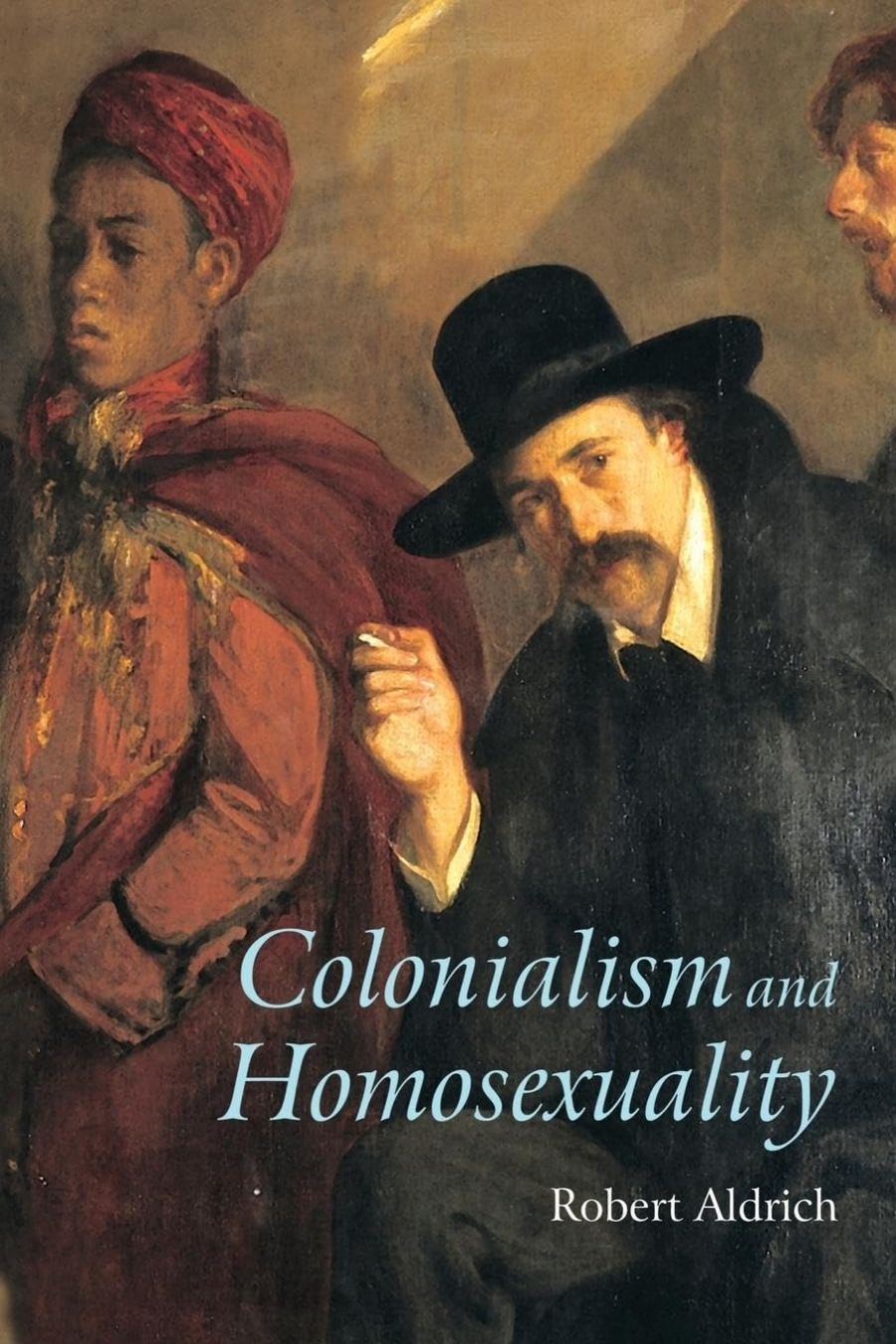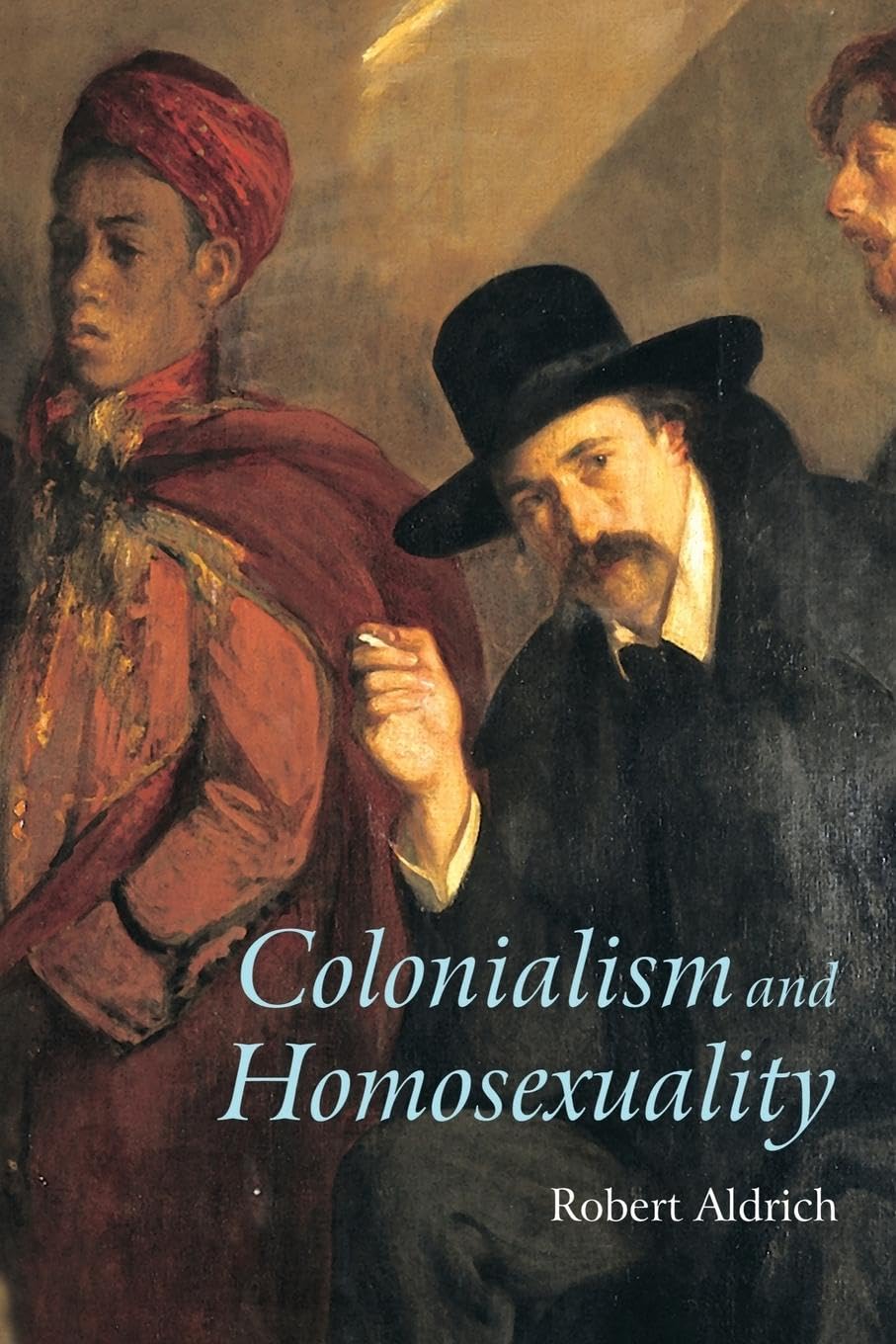
- Free Article: No
- Contents Category: Gay Studies
- Review Article: Yes
- Article Title: Degrees of Latitude
- Online Only: No
- Custom Highlight Text:
One of the remarkable feats of Claire Denis’ recent film Beau Travail is to turn ironing into an erotic spectacle. That most humble of ‘travails’ becomes an important part of the ceaseless, sizzling ballet that the director makes of the daily round of a group of present-day French Legionnaires stationed in Djibouti. The feat is not remarked on in Robert Aldrich’s near-to-encyclopedic Colonialism and Homosexuality, though the film is duly listed in his epilogue, ‘After the Empire’. It certainly qualifies as one of the most vivid recent reminders of that long tradition he traces of representing ‘the whole of the North African world … as a sensuous experience’ – and a sensual one.
- Book 1 Title: Colonialism and Homosexuality
- Book 1 Biblio: Routledge, $49 pb, 448 pp
- Book 1 Cover Small (400 x 600):

- Book 1 Cover (800 x 1200):

Aldrich’s book, as with Denis’ film, concentrates only on all-male experiences of that world, though it extends its geographical boundaries as far south as Australia, notably Sydney: ‘Sodom of the South Seas’, as it used to be called in the mid-nineteenth century, and the author’s own current home base. Fellow Sydneysider Donald Friend, ‘the gay Gauguin’ as he’s styled here, nonetheless felt impelled for long periods of his artistic career to seek ‘a wild, tropical, exotic life among dark-skinned native people’, basing himself in Ceylon for half a decade and Bali for nearly a decade and a half. These are two of the epicentres of Aldrich’s study. While he observes early on how various colonial commentators ‘with little evidence’ claimed that ‘hot climates favoured homosexual vice’, one could be pardoned for deducing the same from the evidence he now supplies in lush and juicy abundance. Neutralise that judgmental word ‘vice’, say ‘hetero’ as well as ‘homo’ (or, rather, try not to think of those categories as mutually exclusive), and the enduring impression you take away is that the smaller the degree of geographical latitude, the more generous the degree of sexual latitude, susceptible as this would remain to outbursts of public scandal, personal reprisals or legal crackdowns.
There’s a correspondingly generous (and sensible) latitude in the author’s connotations of the words in his title. Homosexuality here involves fantasies as much as acts, thwarted or veiled or even unconscious yearnings as much as fully achieved personal relations. Colonialism certainly covers the formal, political varieties: the administrations of the major European states in their territorial possessions in the Middle East, Asia, Africa, the Pacific and Australia (though those in the Americas are pretty much overlooked). Expanding on Ronald Hyam’s pioneering study, Empire and Sexuality: The British Experience (1990), Aldrich has no trouble in supporting Hyam’s claim that colonial administrators from various parts of Europe and at all levels ‘generally saw sexual opportunities as one of the benefits of empire’. But he gives at least as much attention to the erotic capital to be made or distributed through more informal varieties and manifestations of colonialism: trading, tourism, exploration and adventuring, publications and art works using colonial subject matter (from highbrow novels to postcards of lissom Arab street kids or black hunks in satin trunks).
The result is richly suggestive. ‘Ostensibly heterosexual’ texts yield slyly coded or sometimes even unintended homoerotic meanings. The gay’s gaze may be all too keen for such things, though only occasionally (perhaps in the section on John Buchan, for instance) is there any sign of straining or special pleading here. Of Bizet’s famous male love duet from The Pearl Fishers, which we’re accustomed to calling ‘In the Depths of the Temple’, the most that Aldrich allows himself to say is: ‘Although both the composer and the plot of his opera were heterosexual, the aria has nevertheless become an iconic musical representation of friendship between men.’ But earlier on in the book he has brilliantly retrieved for us a much less famous work set partly in a Ceylonese temple – Givoanni Comisso’s novel, Gioco d’infanzia – which suggests the services on offer at these sites go far beyond the conventionally sacred. More like: in the depths of the sauna.
All Asia and Africa might be viewed through this lens as one or other of nature’s saunas. The heat wasn’t the only aphrodisiac in these places, of course (some of them could be bloody cold, after all). Geographical remoteness from Europe, and from the cultural and religious proscriptions of Western bourgeois societies, offered another lure for colonial administrators or adventurers. Sexually speaking, it was a matter not of the tyranny of distance but of the distance of tyranny.
We should be careful of exaggerating this point, however. There’s some debate at least over how stitched up nineteenth-century Western societies really were. Clearly a lot went on behind the stitching, if we acknowledge, as Aldrich singularly fails to do, the evidence in the recently completed multi-volume study of nineteenth-century Western sexuality by Peter Gay. Nothing even unconsciously suggestive should be read into the name of that historian, of course, but Aldrich could afford to be more conscious of the qualifying picture in these gay studies; they are a conspicuous absence from his otherwise impressively bulging bibliography.
Aldrich does acknowledge, however, that what official proscriptions there were in Europe could at times be exported to the colonies and forcibly close the saunas, as it were, when their inmates became too indiscreet. He also acknowledges that some non-Western societies had their own religious proscriptions, puncturing the idyll of free-for-all lubricity under the palms or in the thick of the jungle. ‘Full of Eastern promise’, one might say, did not necessarily mean full of Eastern promiscuity.
On the other hand, the exercise of Western control, both official and unofficial, could all too easily abet where not enforce irregular sexual liaisons in the colonies. As Aldrich puts it, ‘the power relations inherent in the colonial order made it possible for European men to attain their desires with subalterns, servants and others over whom they lorded’. Imperialism, as he sums up later, ‘promoted hierarchical relationships propitious to sexual commerce’. But he subtly resists the more po-faced versions of po-mo and post-colonial theory in showing that such commerce was not entirely oppressive, could be genuinely two-way and of mutual if not equal benefit to the parties involved, and was often based on strong emotions of affection and friendship that long outlasted the colonial moment. Sometimes the twain did meet – and stick together. Moreover, there were several recorded instances when sexual encounters between Europeans and colonial subjects led not to a reinforcement but rather to the erosion of imperial hierarchical values. As Aldrich points out in the case of E.M. Forster, imperialism ‘provided sexual opportunities’ for the novelist, both in Egypt and India, ‘but sexual experiences with men from the colonies inspired his critical stance on imperialism’.
There’s no clear reason why such opportunities and experiences couldn’t have been available in, say, colonial Quebec or Tasmania (and records of such may yet be extant). But, in this book at least, we keep returning to the temperatures of warmer climes as a key factor in erotic enchantment, if not political disenchantment. Forster himself is quoted as saying that ‘the heat … provoked me sexually’, and, in one of his voyaging stories recounted here, he nicely calibrates the progressive slipping away of inhibitions as the equator is approached. Noël Coward famously affected to puzzle over why, in tropical zones, ‘mad dogs and Englishmen go out in the midday sun’, yet, in later life, he hotfooted it to Jamaica readily enough for much of each year and he chose to be buried there. Those immortal words of his – they can still be heard on a recording that floats out from the trees of his old house on the island – are not quoted in Colonialism and Homosexuality, but Aldrich’s book provides an illuminating explanatory context for them. It also reveals how and why so many Europeans without a drop of English blood were enticed to come out in the same steamy noontide.


Comments powered by CComment